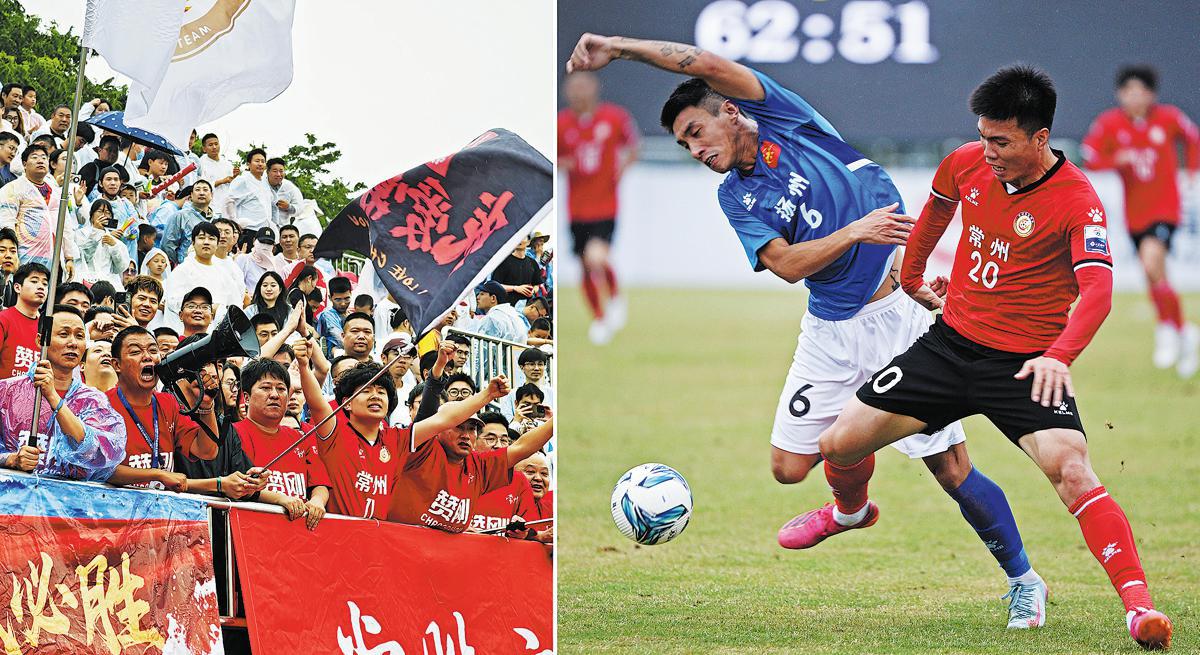
In the popular Chinese Hupu app, the emergence of the Jiangsu Football City League has been striking and captivating, standing out alongside channels featuring the English Premier League, Chinese Super League, La Liga, Bundesliga and Serie A.
The 2025 Jiangsu Football City League has recently surged in popularity, prompting the app to urgently add a dedicated "Jiangsu League" channel.
Slogans such as "No match-fixing, no biased referees, only longstanding rivalries" and "Match comes first, friendship fourteenth" have become part of the online banter, highlighting the intense rivalries among the 13 cities in Jiangsu. Scarcity of tickets and heated discussions on social media have added to the excitement, with the Douyin hashtag #JiangsuCity-League# surpassing 100 million views.
The league's motto, "Fighting for city honor", has drawn ordinary citizens into stadiums, igniting a passion for sports across Jiangsu's cities.
Jointly organized by the Jiangsu Provincial Administration of Sport and the governments of the 13 cities, the tournament promotes the principle of "participation of all citizens and city honor", advocating for a deeper integration of soccer and national fitness. The inaugural match kicked off on May 10, with the final set for Nov 2.
A total of 516 players from the 13 teams have qualified: 85 university students, 69 high school and vocational school students, 29 professional players (which include one high school player and three university players) and 337 amateur players from various professions. Player ages range from 16 to 40.
To encourage participation and audience engagement, matches are primarily scheduled on weekends, with one round per week. While the opening and final matches will be televised, other games are streamed online.
This weekend, the third round of the league is set to kick off, with 22,198 fans flocking to the Xuzhou Olympic Sports Center Stadium. Tickets for the match between Nanjing and Wuxi sold out quickly, leading scalpers to inflate prices from 80 yuan ($11) to 600 yuan, compared to the original price of 10 yuan.
According to the provincial sport administration, average attendance for the first two rounds exceeded 8,000, surpassing that of China League One during the same period. Attendance for the third round is projected to average more than 10,000, with cities such as Xuzhou and Yancheng drawing over 20,000 fans.
ALSO READ: China's Village Super League to cooperate with S. Korea's Incheon in football promotion
Some cities, including Yancheng and Changzhou, have introduced incentives to attract visiting fans. Yancheng, for example, is offering free tickets to scenic spots and local specialty egg pancakes for out-of-town spectators.
During a match between Changzhou and Yangzhou, Changzhou welcomed more than 60,000 tourists from Yangzhou. Many tourist attractions in Changzhou offered free admission to Yangzhou visitors, and restaurants extended hours and launched special fan packages.
Wang Xiaowan, vice-chairman of the Jiangsu Football Association, said he was amazed by the tournament's popularity.
"The competition has transformed soccer into a cultural phenomenon and a way of life, with the public teasing each other with jokes online," he said, adding that the administration has introduced innovative competition formats.
"The new rules, including those regulating player qualification, were collectively discussed and formulated through group efforts to ensure full democratic participation," Wang said.
The last team among the 13, Changzhou, has shown the humble and resilient side of soccer. Composed of players from various professions, with an average age of 28 — older than their opponents by four to five years — the team has endured three straight defeats. Coach Fan Yi remains undeterred.
"The players have given their all. The passion has earned them applause and admiration," Fan said.
Reflecting on the broader impact of the league, Wu Yuyang, a journalist at the Jiaohuidian news app, noted that the traditional focus on the World Cup has often driven efforts to replicate foreign league models in China.
"In contrast, Jiangsu's approach has presented a new perspective on soccer development, integrating the sport with city pride and local culture," Wu said.
"Players are not hired with high salaries but are ordinary people around us; spectators are not just fans but local relatives, friends and citizens; the field is not just a stage for professional players but a place where everyone can find a sense of belonging," he said.
READ MORE: Team spirit sees soccer achieve another goal
"This model does not pursue top-level standards but can stimulate the broadest local participation. It is creating a more valuable wealth — making soccer part of citizens' lives and allowing each city to have its own soccer memories."


